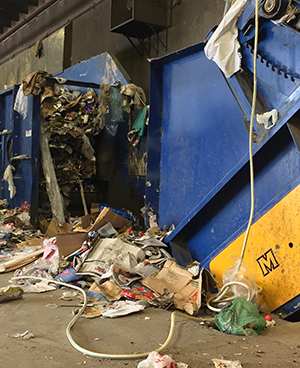One of the ways the Recycling Modernization Act aims to build a resilient and responsible recycling system in Oregon is to reduce contamination in the commingled recycling. In addition to requiring improved sorting at recycling processing facilities, the RMA will fund programming by local governments to help Oregon residents and businesses learn how to recycle right. DEQ also has a role to play in supporting this work, by evaluating the relative cost-effectiveness of different methods for reducing contamination and developing a list of approved program elements for local governments to use in their contamination reduction efforts.
The RMA requires DEQ to:
- Establish statewide recycling contamination reduction goals, evaluate the relative cost-effectiveness of different educational programs and other methods for reducing recycling contamination, and establish and maintain a list of approved contamination reduction program elements, among other requirements (Oregon Revised Statute 459A.929).
- Establish forms and procedures for commingled recycling processing and recycling reload facilities to evaluate and describe levels of inbound contamination (Oregon Revised Statute 459A.959)
The RMA requires local governments in communities of over 4,000 people to establish and implement a program to reduce contamination (Oregon Revised Statute 459A.929).
The RMA requires producer responsibility organizations to compensate local governments up to $3 per capita for contamination reduction programming work (Oregon Revised Statute 459A.890(4)).
Learn more
DEQ wil be soon adding forms and procedures to evaluate and describe levels of inbound contamination, pursuant to ORS 459A.959. Sign up for updates by text or email at via GovDelivery.
Informational material
Study Results: Cost-Effective Contamination Reduction Methods – Oregon DEQ Multi-Sector Recycling Contamination Study,
Courtesy of The Recycling Partnership and Cascadia Consulting Group
What is recycling contamination?
Recycling contamination is made up of both non-recyclable items and recyclable items that are dirty or unsuitable for a particular recycling stream. Common contaminants that cause problems in Oregon's recycling programs include plastic bags, film plastics, liquids, food, soiled packaging, plastic clamshells, garden hoses, wire hangers, textiles, diapers, electronics, and batteries. Some of these materials can be recycled separately, but they cause significant problems when mixed with other recyclables in commingled collection systems.
Contaminants cause problems all along the journey of recyclables throughout the system. Food, liquids, oil, or hazardous chemicals can contaminate paper and other materials in recycling bins making whole batches of materials compressed in recycling trucks unusable. Once recyclables arrive at a material recovery facility, or MRF, trained sorters hand-pick most contaminants out of piles of recyclables, but a lot of contaminants can slip through the sorting process such as clamshells, plastic bags, and food soiled items, among others. Materials like plastic bags and garden hoses can also damage or get stuck in the mechanical equipment that separates different types of recyclables. Contaminants create health and safety hazards for the people working in these facilities.